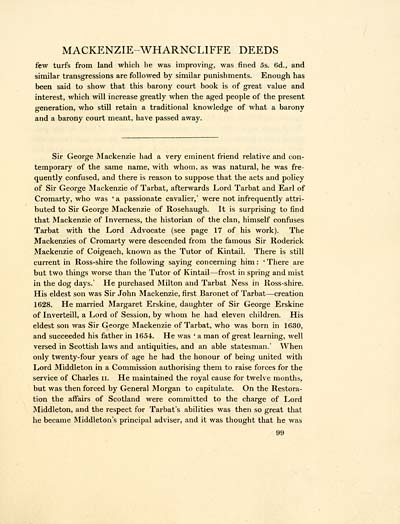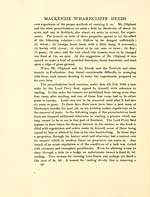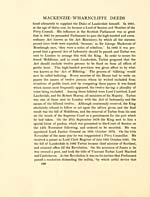Download files
Complete book:
Individual page:
Thumbnail gallery: Grid view | List view

MACKENZIE-WHARNCLIFFE DEEDS
few turfs from land which lie was improving, was fined 5s. 6d., and
similar transgressions are followed by similar punishments. Enough has
been said to show that this barony court book is of great value and
interest, which will increase greatly when the aged people of the present
generation, who still retain a traditional knowledge of what a barony
and a barony court meant, have passed away.
Sir George Mackenzie had a very eminent friend relative and con-
temporary of the same name, with whom, as was natural, he was fre-
quently confused, and there is reason to suppose that the acts and policy
of Sir George Mackenzie of Tarbat, afterwards Lord Tarbat and Earl of
Cromarty, who was 'a passionate cavalier,' were not infrequently attri-
buted to Sir George Mackenzie of Rosehaugh. It is surprising to find
that Mackenzie of Inverness, the historian of the clan, himself confuses
Tarbat with the Lord Advocate (see page 17 of his work). The
Mackenzies of Cromarty were descended from the famous Sir Roderick
Mackenzie of Coigeach, known as the Tutor of Kintail. There is still
current in Ross-shire the following saying concerning him : ' There are
but two things worse than the Tutor of Kintail — frost in spring and mist
in the dog days.' He purchased Milton and Tarbat Ness in Ross-shire.
His eldest son was Sir John Mackenzie, first Baronet of Tarbat — creation
1628. He married Margaret Erskine, daughter of Sir George Erskine
of Inverteill, a Lord of Session, by whom he had eleven children. His
eldest son was Sir George Mackenzie of Tarbat, who was born in 1630,
and succeeded his father in 1654. He was ' a man of great learning, well
versed in Scottish laws and antiquities, and an able statesman.' When
only twenty-four years of age he had the honour of being united with
Lord Middleton in a Commission authorising them to raise forces for the
service of Charles n. He maintained the royal cause for twelve months,
but was then forced by General Morgan to capitulate. On the Restora-
tion the affairs of Scotland were committed to the charge of Lord
Middleton, and the respect for Tarbat's abilities was then so great that
he became Middleton's principal adviser, and it was thought that he was
99
few turfs from land which lie was improving, was fined 5s. 6d., and
similar transgressions are followed by similar punishments. Enough has
been said to show that this barony court book is of great value and
interest, which will increase greatly when the aged people of the present
generation, who still retain a traditional knowledge of what a barony
and a barony court meant, have passed away.
Sir George Mackenzie had a very eminent friend relative and con-
temporary of the same name, with whom, as was natural, he was fre-
quently confused, and there is reason to suppose that the acts and policy
of Sir George Mackenzie of Tarbat, afterwards Lord Tarbat and Earl of
Cromarty, who was 'a passionate cavalier,' were not infrequently attri-
buted to Sir George Mackenzie of Rosehaugh. It is surprising to find
that Mackenzie of Inverness, the historian of the clan, himself confuses
Tarbat with the Lord Advocate (see page 17 of his work). The
Mackenzies of Cromarty were descended from the famous Sir Roderick
Mackenzie of Coigeach, known as the Tutor of Kintail. There is still
current in Ross-shire the following saying concerning him : ' There are
but two things worse than the Tutor of Kintail — frost in spring and mist
in the dog days.' He purchased Milton and Tarbat Ness in Ross-shire.
His eldest son was Sir John Mackenzie, first Baronet of Tarbat — creation
1628. He married Margaret Erskine, daughter of Sir George Erskine
of Inverteill, a Lord of Session, by whom he had eleven children. His
eldest son was Sir George Mackenzie of Tarbat, who was born in 1630,
and succeeded his father in 1654. He was ' a man of great learning, well
versed in Scottish laws and antiquities, and an able statesman.' When
only twenty-four years of age he had the honour of being united with
Lord Middleton in a Commission authorising them to raise forces for the
service of Charles n. He maintained the royal cause for twelve months,
but was then forced by General Morgan to capitulate. On the Restora-
tion the affairs of Scotland were committed to the charge of Lord
Middleton, and the respect for Tarbat's abilities was then so great that
he became Middleton's principal adviser, and it was thought that he was
99
Set display mode to:
![]() Universal Viewer |
Universal Viewer | ![]() Mirador |
Large image | Transcription
Mirador |
Large image | Transcription
Images and transcriptions on this page, including medium image downloads, may be used under the Creative Commons Attribution 4.0 International Licence unless otherwise stated. ![]()
| Histories of Scottish families > Ancient deeds and other writs in the Mackenzie-Wharncliffe charter-chest > (127) Page 99 |
|---|
| Permanent URL | https://digital.nls.uk/95524889 |
|---|
| Description | A selection of almost 400 printed items relating to the history of Scottish families, mostly dating from the 19th and early 20th centuries. Includes memoirs, genealogies and clan histories, with a few produced by emigrant families. The earliest family history goes back to AD 916. |
|---|

